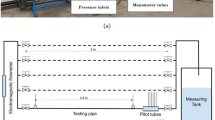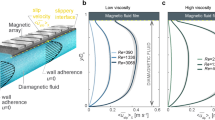Abstract
GADD1 has summarized some of the recent work in friction reduction by high molecular weight additives and concludes that the primary mechanism is a thickening of the laminar sublayer. Investigations of the effect of such additives on pipe flow carried out at West Virginia University support this explanation.
This is a preview of subscription content, access via your institution
Access options
Subscribe to this journal
Receive 51 print issues and online access
$199.00 per year
only $3.90 per issue
Buy this article
- Purchase on Springer Link
- Instant access to full article PDF
Prices may be subject to local taxes which are calculated during checkout
Similar content being viewed by others
References
Gadd, G. E., Nature, 212, 875 (1966).
Castro, W., thesis, West Virginia Univ. (1966).
Ripken, J. E., and Pilch, M., Univ. Minnesota Project No. 71 (1964).
Costrell, J., thesis, West Virginia Univ. (1966).
Squire, W., App. Sci. Res., A, 10, 23 (1961).
Davies, G. A., and Ponter, A. B., Nature, 212, 66 (1966).
Deryaguin, B. V., Pure App. Chem., 10, 375 (1965).
Author information
Authors and Affiliations
Rights and permissions
About this article
Cite this article
SQUIRE, W., CASTRO, W. & COSTRELL, J. Mechanism of Turbulent Friction Reduction in Pipes by Dissolved Additives. Nature 213, 1008–1009 (1967). https://doi.org/10.1038/2131008a0
Received:
Issue Date:
DOI: https://doi.org/10.1038/2131008a0
This article is cited by
-
Power laws of reduced turbulent friction for polymer solutions
Journal of Engineering Physics (1975)
-
On similarity laws for the developed turbulence of dilute polymer solutions
Journal of Engineering Physics (1973)
Comments
By submitting a comment you agree to abide by our Terms and Community Guidelines. If you find something abusive or that does not comply with our terms or guidelines please flag it as inappropriate.



